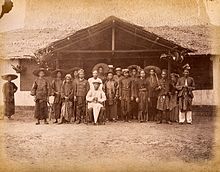海山公司
海山公司,早期传说源自洪门(天地会)组织[1],主要活动在南洋,尤其在马来亚[2]。1799年在海峡殖民地的槟城正式成立以惠州客家人和顺德、番禺等广府人为主的帮派[3]。后来其实力跨到整个马来亚及新加坡。
Hai San Society | |
 巴生海山党人、当地华人甲必丹及当地马来土酋的合影,摄于1874年7月 | |
| 创建时间 | 1799年 |
|---|---|
| 创建地点 | |
| 活跃年代 | 1820年—1890年 |
| 活动范围 | 英属马来亚一切华人聚集地 |
| 种族特点 | 客家人(惠州人)、广府人(顺德人、番禺人等) |
| 犯罪活动 | 售卖鸦片等毒品、阴谋、贿赂、勒索、雇佣兵 |
| 敌对组织 | 义兴公司 |
历史
编辑海山地下组织的历史可以追溯至乔治市开埠之初的1799年,19世纪马来土邦苏丹及王侯曾拉拢海山公司助战,另一方就会寻求义兴公司。所以其军事实力不容忽视。
1832年有记载马六甲马德拉斯轻步兵第23团的军官(23 Regiment, Madras Light Infantry, in Malacca)托马斯·约翰·纽博尔德(1807年—1850年)表示:
| “ | 他们自称‘公司’来招募或强迫马来亚定居的华裔加入,慢慢累积为强大战力的反政府组织(这里指政府的是中国的清朝)。而当中他们在马来亚主要通过贿赂,威胁造谣,有时甚至通过公开暴力达到其目的。甚至一些统治者甚至会招募这一些组织为佣兵或官员。 | ” |
| ——[4][5] | ||
早期马来亚(星马两地)的华人私会党的形成众所皆知,他们本源于中国的天地会,并且与天地会有着千丝万缕、错综复杂的关系。
据史载,新加坡最早发生私会党引发的格斗最初发生在1824年,当时的新加坡政治家莱佛士的私人秘书,著名马来作家文西阿都拉(笔名:Munshi Abdullah,1796—1854),于1824年冒险参观新加坡市郊天地会的入会仪式。1825年,众多私会党中,英殖民政府就发现了“义兴”、“海山”、“合成”、“华记”四个派别。
最早私会党总部通常设在槟榔屿乔治市,并在马来亚各地都有支会。其中有霹雳州拉律、雪兰莪芦骨(当时属雪兰莪)、森美兰双溪芙蓉、雪兰莪巴生等地,后以雪兰莪的吉隆坡及加影为最重要,因为这些地区都是以锡米(Biji Timah)挖掘而吸引华人南来聚集之地。就在这个时间段,甲必丹郑景贵开埠太平市而发生的“拉律战争”、甲必丹叶亚来开埠吉隆坡而发生的“雪兰莪内战”,都可以见到私会党之间的械斗,及马来王侯为了保身及获得利益而拉拢华人私会党。由此可见,在当时若是南下以采矿为生者皆是根据自己祖籍而被“强制”加入帮会,以寻求“保护”。
与天地会
编辑尽管新马两地秘密会社是在地社会的一部分,与中国天地会肯定存在异同。不过,中国天地会对东南亚秘密会党的影响仍极其巨大,从组织结构、管理模式、到帮派礼仪、暗语、腰凭,在新马两地秘密会党无不受到天地会影响。例如组织方面:
总部:
- 主帅
- 香主
- 大哥
- 二哥
分部:
- 总理
- 先生
- 先锋
- 红棍
- 管花(包括才富)
- 铁板草鞋
早期的义兴公司现称“老义兴”(洪门正二房洪顺堂人),海山公司现称“老海山”(洪门正三房家后堂人)的组织有白扇先生、红棍以及草鞋等几个等级。白扇在组织里的地位最高,主持开坛仪式。海山派客家私会党属于“天合会”(也许是取自天地会与三合会),在新加坡的总部设在海山街(克罗士街上段,Upper Cross Street),打着“海山公司”(Hai San Kongsi) 四个大字招牌。当时还有其他的大型私会党包括福建帮义福、客家帮洪家等,帮派间的利益冲突与暴力械斗,就这样从18世纪末叶延续至20世纪初的两个世纪。
参考资料
编辑- ^ Encyclopædia Britannica
- ^ Triad Societies: Western Accounts of the History, Sociology and Linguistics of Chinese Secret Societies By Kingsley Bolton, Gustaaf Schlegel, Herbert Allen Giles, Christopher Hutton, J. S. M. Ward, Mervyn Llewelyn Wynne, W. P. Morgan, William Stanton, W. G. Stirling; Contributor Kingsley Bolton, Chris Hutton; Published by Taylor & Francis, 2000; ISBN 0-415-24397-1, ISBN 978-0-415-24397-1
- ^ Straits Settlements Factory Records Vol 101 (1825) Page 1476-1480 and 1604
- ^
“ The secret fraternities in which they (the Chinese settlers) enroll themselves for mutual protection and support, prove powerful engines for political combinations, as the Dutch have repeatedly experienced during their long administration in Java and in the Malay States. In China itself, these societies are deemed so dangerous to the Government as to be interdicted under penalty of death. At Pinang in 1799, they set the administration in defiance and strong measures were necessary to reduce them to obedience. Even in the present-day, the ends of justice are frequently defeated both at Pinang, Malacca, and Singapore: by bribery, false swearing, and sometimes by open violence, owing to combinations of these fraternities, formed for the purpose of screening guilty members from detection and punishment. In European Settlements, they are under the general control of an officer, or headman styled "Capitan", who receives a salary from the Government and is responsible in some measure, for the orderly conduct of his countrymen, whose representative and official organ he is. Their interior affairs, disputes, and private interests are arranged by the heads of their respective "Kongsis" or fraternities.
” ——Thomas John Newbold (1807–1850), an officer in the 23 Regiment, Madras Light Infantry, in Malacca - ^ Political and Statistical Account of the British Settlements in the Straits of Malacca, Viz: Pinang, Malacca, and Singapore By Thomas John Newbold, Published by J. Murray, 1839, Pages 13-14